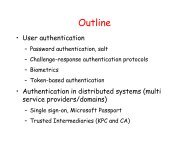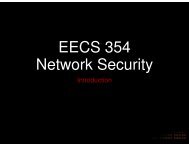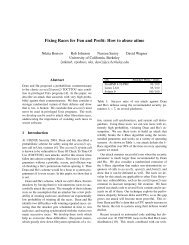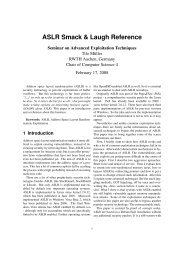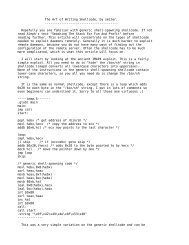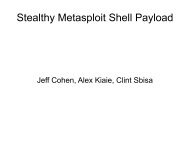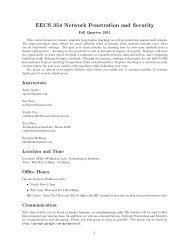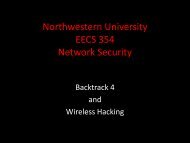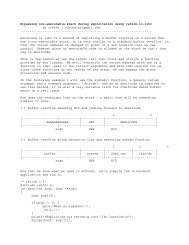Advanced Return to libc Exploits
Advanced Return to libc Exploits
Advanced Return to libc Exploits
Create successful ePaper yourself
Turn your PDF publications into a flip-book with our unique Google optimized e-Paper software.
The sample vulnerable code follows:<br />
void f2(char * buf)<br />
{<br />
printf(buf); // format bug here<br />
some_<strong>libc</strong>_function();<br />
}<br />
void f1(char * user_controlled)<br />
{<br />
char buf[1024];<br />
buf[0] = 0;<br />
strncat(buf, user_controlled, sizeof(buf)-1);<br />
f2(buf);<br />
}<br />
Suppose f1() is being called. With the help of a malicious format<br />
string we can alter some_<strong>libc</strong>_function's GOT entry so that it contains the<br />
address of the following piece of code:<br />
addl $imm, %esp<br />
ret<br />
that is, some epilogue of a function. In such case, when some_<strong>libc</strong>_function<br />
is called, the "addl $imm, %esp" instruction will alter %esp. If we choose<br />
an epilogue with a proper $imm, %esp will point within "buf" variable,<br />
whose content is user controlled. From this moment on, the situation looks<br />
just like in case of a stack buffer overflow. We can chain functions, use<br />
ret-in<strong>to</strong>-dl etc.<br />
Another case: a stack buffer overflow by a single byte. Such<br />
overflow nullifies the least significant byte of a saved frame pointer.<br />
After the second function return, an attacker has a fair chance <strong>to</strong> gain<br />
full control over the stack, which enables him <strong>to</strong> use all the presented<br />
techniques.<br />
----[ 7.3 - Other non-exec solutions<br />
I am aware of two other solutions, which make all data areas<br />
non-executable on Linux i386. The first one is RSX [10]. However, this<br />
solution does not implement stack nor libraries base randomization, so<br />
techniques described in chapter 3 are sufficient <strong>to</strong> chain multiple function<br />
calls.<br />
Some additional effort must be invested if we want <strong>to</strong> execute<br />
arbitrary code. On RSX, one is not allowed <strong>to</strong> execute code placed in a<br />
writable memory area, so the mmap(...PROT_READ|PROT_WRITE|PROT_EXEC) trick<br />
does not work. But any non-exec scheme must allow <strong>to</strong> execute code from<br />
shared libraries. In RSX case, it is enough <strong>to</strong> mmap(...PROT_READ|PROT_EXEC)<br />
a file containing a shellcode. In case of a remote exploit, the function<br />
chaining allows us <strong>to</strong> even create such a file first.<br />
The second solution, kNoX [11], is very similar <strong>to</strong> RSX. Additionally,<br />
it mmaps all libraries at addresses starting at 0x00110000 (just like in<br />
the case of Solar's patch). As mentioned at the end of 3.4, this protection<br />
is insufficient as well.




